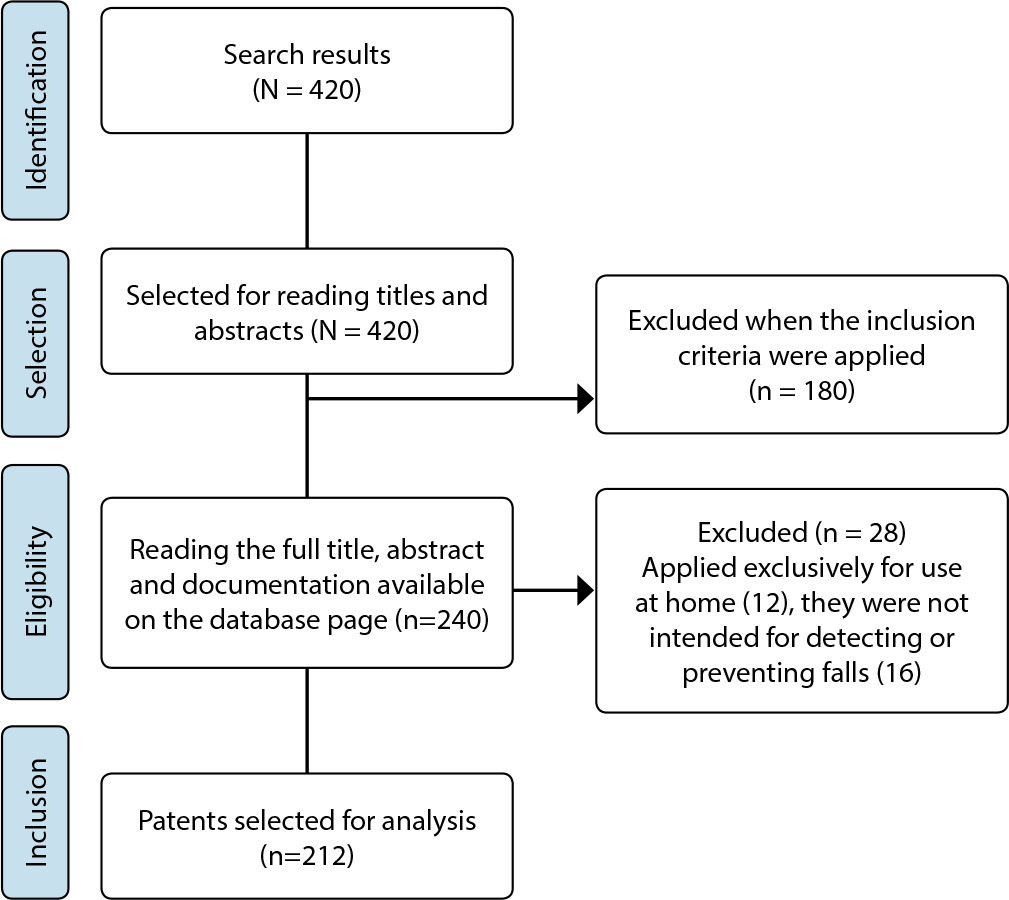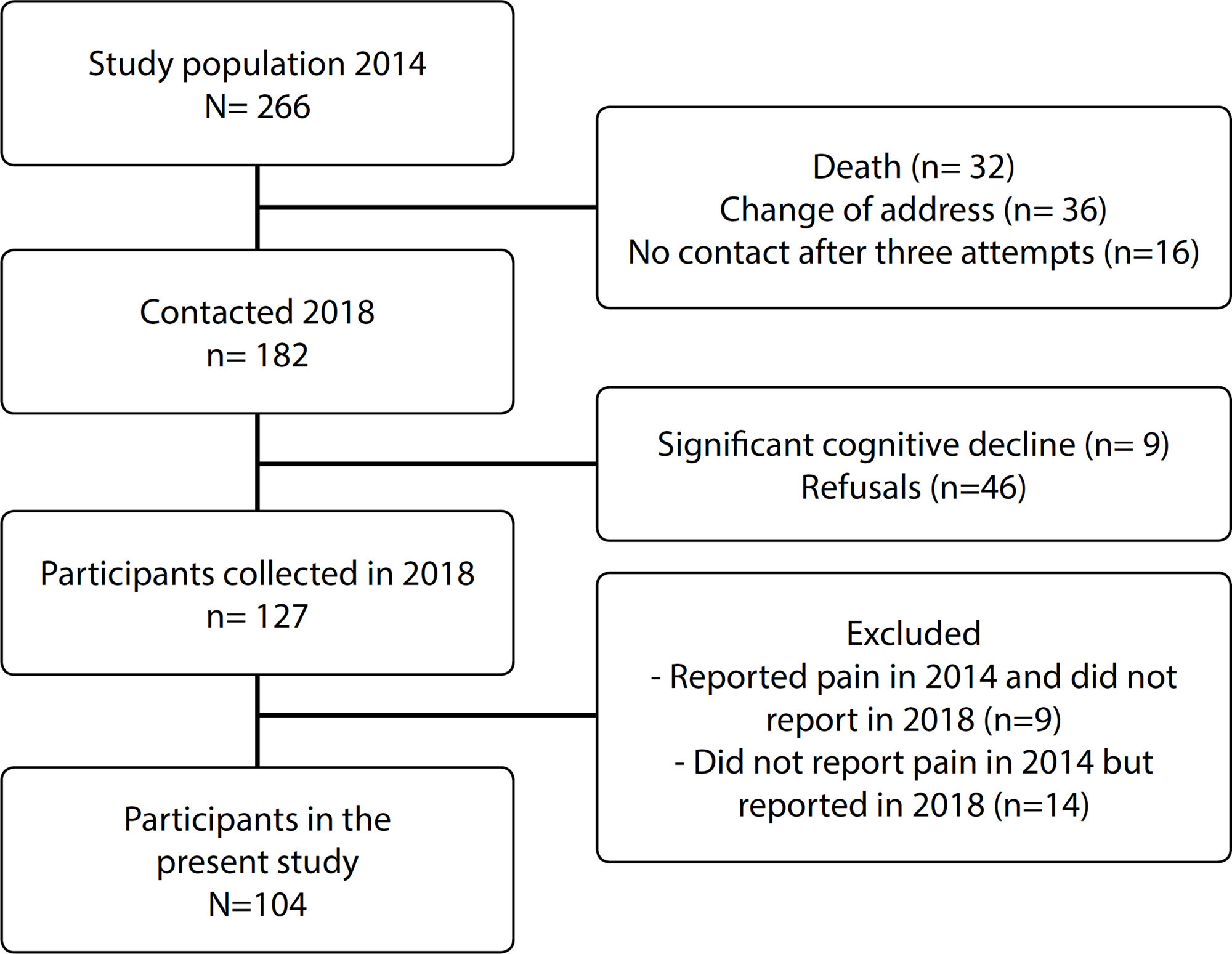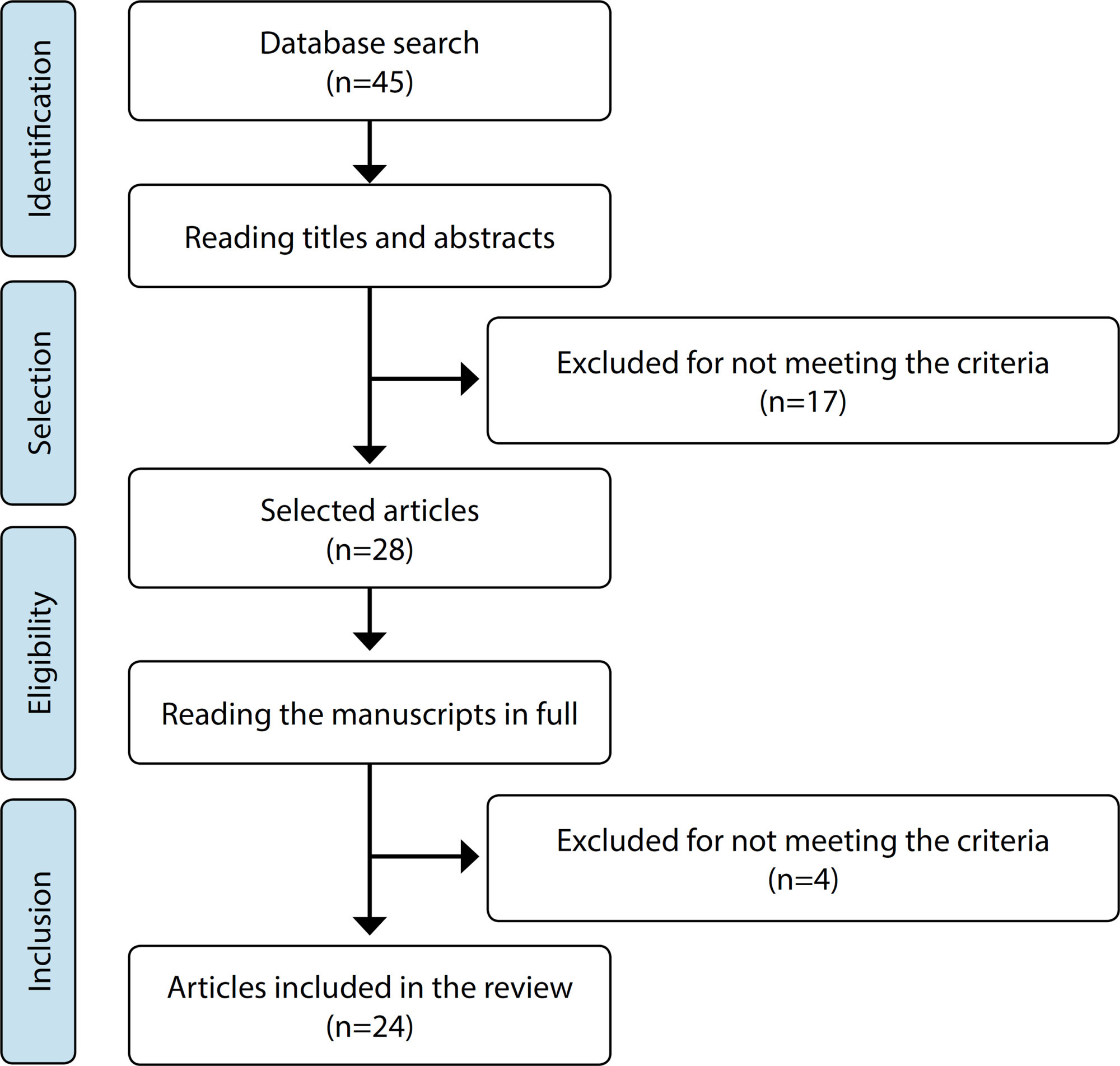-
02-26-2024
Nurse Navigator of Cancer Patients: contributions to the discussion on the national stage
Revista Brasileira de Enfermagem. 2024;77(2):e770201
Abstract
Nurse Navigator of Cancer Patients: contributions to the discussion on the national stage
Revista Brasileira de Enfermagem. 2024;77(2):e770201
DOI 10.1590/0034-7167.2024770201
Views0The professional practice of patient navigation is incipient in Brazil and, therefore, a broad discussion with various sectors of society is essential, which is the main purpose of this editorial. Shall we start with the story. Patient navigation was defined in 1989 as a community-based service delivery intervention aimed at appropriately promoting access to diagnosis […]See more -
REVIEW02-26-2024
Evidence of intrauterine device insertion by nurses in Primary Health Care: an integrative review
Revista Brasileira de Enfermagem. 2024;77(1):e20230134
Abstract
REVIEWEvidence of intrauterine device insertion by nurses in Primary Health Care: an integrative review
Revista Brasileira de Enfermagem. 2024;77(1):e20230134
DOI 10.1590/0034-7167-2023-0134
Views0See moreABSTRACT
Objectives:
to synthesize and analyze evidence on intrauterine device insertion by nurses in Primary Health Care.
Methods:
an integrative review, carried out in the BDENF, CINAHL, LILACS, SciELO, Scopus, PubMed and Web of Science databases in June 2022, delimiting the period from 1960 to 2022.
Results:
141 articles were identified in the initial search, and 10 studies made up the final sample. Four (40%) were developed in the United States and one (10%) in Brazil, with publications from 1979 to 2021. The findings were grouped into three categories: Nurse training to insert an intrauterine device; Nurses’ competency to insert an intrauterine device; and Women’s access to intrauterine devices.
Conclusions:
nurse theoretical and practical training is a prominent element, consolidated in the favorable outcomes of insertions performed by nurses and satisfaction among women, a practice that has expanded access to the contraceptive method in Primary Health Care.

-
ORIGINAL ARTICLE02-26-2024
Artificial intelligence to predict bed bath time in Intensive Care Units
Revista Brasileira de Enfermagem. 2024;77(1):e20230201
Abstract
ORIGINAL ARTICLEArtificial intelligence to predict bed bath time in Intensive Care Units
Revista Brasileira de Enfermagem. 2024;77(1):e20230201
DOI 10.1590/0034-7167-2023-0201
Views0See moreABSTRACT
Objectives:
to assess the predictive performance of different artificial intelligence algorithms to estimate bed bath execution time in critically ill patients.
Methods:
a methodological study, which used artificial intelligence algorithms to predict bed bath time in critically ill patients. The results of multiple regression models, multilayer perceptron neural networks and radial basis function, decision tree and random forest were analyzed.
Results:
among the models assessed, the neural network model with a radial basis function, containing 13 neurons in the hidden layer, presented the best predictive performance to estimate the bed bath execution time. In data validation, the squared correlation between the predicted values and the original values was 62.3%.
Conclusions:
the neural network model with radial basis function showed better predictive performance to estimate bed bath execution time in critically ill patients.
-
ORIGINAL ARTICLE02-26-2024
Technological prospecting of patents related to monitoring accidents due to falls in hospitals
Revista Brasileira de Enfermagem. 2024;77(1):e20230084
Abstract
ORIGINAL ARTICLETechnological prospecting of patents related to monitoring accidents due to falls in hospitals
Revista Brasileira de Enfermagem. 2024;77(1):e20230084
DOI 10.1590/0034-7167-2023-0084
Views0See moreABSTRACT
Objectives:
to map the production of technologies aimed at monitoring falls in a hospital environment protected by registered patents.
Methods:
a technological prospecting of international patents, with a quantitative approach, with search carried out between February and March 2022 in the Derwent Innovations Index database with descriptors fall, hospital, monitoring.
Results:
212 patents were found, with the majority filed and published since 2010, by Tran B (9) and Cerner Innovation Inc (9), focused on health technology. Universities were responsible for 13% of deposits. There was a predominance of records from the United States (43.4%), China (21.7%) and Japan (12.3%), in addition to technological strategies classified as devices for the environment (80.7%) and for preventing falls (66.5%) as well as trend towards resources with multiple functionalities in the same technology.
Conclusions:
the plurality of functions in the same device reflects the search for optimizing resources and the concern with comprehensive care.

-
ERRATUM02-26-2024
ERRATUM
Revista Brasileira de Enfermagem. 2024;77(1):e20230045
Abstract
ERRATUMERRATUM
Revista Brasileira de Enfermagem. 2024;77(1):e20230045
DOI 10.1590/0034-7167.20247701e04
Views2In the article “Coping strategies for chronically ill children and adolescents facing the COVID-19 pandemic”, with DOI number: , published in Revista Brasileira de Enfermagem, 2023;76(Suppl 2):e20230045, in the author:Where it read:[…]See more -
ERRATUM02-26-2024
ERRATUM
Revista Brasileira de Enfermagem. 2024;77(1):e2024n1e02
Abstract
ERRATUMERRATUM
Revista Brasileira de Enfermagem. 2024;77(1):e2024n1e02
DOI 10.1590/0034-7167.20247701e02
Views2In the article “Active teaching model to promote critical thinking”, with DOI number: , published in Revista Brasileira de Enfermagem, 2019;72(1):293-8, on page 297:Include before REFERENCES:[…]See more -
ERRATUM02-26-2024
ERRATUM
Revista Brasileira de Enfermagem. 2024;77(1):e20160061
Abstract
ERRATUMERRATUM
Revista Brasileira de Enfermagem. 2024;77(1):e20160061
DOI 10.1590/0034-7167.20247701e03
Views2In the article “Nurses in the labor market: professional insertion, competencies and skills”, with DOI number: , published in Revista Brasileira de Enfermagem, 2017;70(6):1220-6, on page 1225:Include before REFERENCES:[…]See more -
REVIEW02-26-2024
Practice of immersion in hot water to relieve pain in neonatology: an integrative review
Revista Brasileira de Enfermagem. 2024;77(1):e20230260
Abstract
REVIEWPractice of immersion in hot water to relieve pain in neonatology: an integrative review
Revista Brasileira de Enfermagem. 2024;77(1):e20230260
DOI 10.1590/0034-7167-2023-0260
Views1See moreABSTRACT
Objectives:
to identify immersion use in hot water to relieve pain in newborns.
Methods:
an integrative literature review, carried out in the PubMed, VHL, EMBASE, Scopus, CINAHL, Cochrane and SciELO databases, with investigations in English, Spanish, French or Portuguese, published between 2002 and 2022. The Health Sciences Descriptors (DeCS) and Medical Subject Headings (MeSH) were used to answer the following question: what are the uses of hot water immersion in relieving pain in newborns?
Results:
nine studies were included, mainly Brazilian, experimental, with a predominance of strong and moderate levels of evidence. Hydrotherapy and bath use (immersion and bandaging) was observed, promising interventions in reducing pain scores, assessed using scales, physiological and endocrine parameters.
Conclusions:
hot water proved to be a promising non-pharmacological intervention in relieving pain in infants in different contexts.

-
02-08-2021
Elder abuse: actions and suggestions by Primary Health Care professionals
Revista Brasileira de Enfermagem. 2021;74:e20200263
Abstract
Elder abuse: actions and suggestions by Primary Health Care professionals
Revista Brasileira de Enfermagem. 2021;74:e20200263
DOI 10.1590/0034-7167-2020-0263
Views0See moreABSTRACT
Objective:
to analyze the actions and suggestions of Primary Care professionals in relation to elder abuse.
Method:
this is a research with a qualitative approach based on the realization of focus groups with professionals from Primary Health Care in a city in the interior of São Paulo. The methodological stance of Hermeneutic-Dialectic thinking (HD) was adopted.
Results:
two themes were listed: Actions taken by health professionals and Suggestions for improving care for elderly victims of violence.
Final considerations:
professionals emphasized the need to implement new resources and improve the functioning of existing ones, so that comprehensive care is possible, in order to prevent and intervene in the important social and public health problem that violence represents.
-
05-21-2021
Influence of chronic pain on cognitive performance in elderly caregivers: a longitudinal study
Revista Brasileira de Enfermagem. 2021;74:e20200412
Abstract
Influence of chronic pain on cognitive performance in elderly caregivers: a longitudinal study
Revista Brasileira de Enfermagem. 2021;74:e20200412
DOI 10.1590/0034-7167-2020-0412
Views0See moreABSTRACT
Objective:
to compare cognitive performance of elderly caregivers with and without chronic pain over four years and verify the effect of pain intensity on cognitive performance of elderly caregivers with chronic pain.
Method:
a longitudinal study with data collected in 2014 and 2018. Community-dwelling elderly caregivers of a Brazilian city participated in the study. Cognition was assessed using the Addenbrooke’s Cognitive Examination instrument. Pain was assessed by an 11-point scale. For data analysis, a mixed linear model and ANCOVA with a 5% significance level were used.
Results:
they were divided into two groups. A cognitive decline over four years was found in elderly people with pain (p=0.02; 95%CI=0.32-4.25), while those without pain did not show a significant change.
Conclusion:
the results show that elderly caregivers with pain had a worse cognitive performance, but when comparing groups with the ANCOVA test for intergroup analysis, there was no difference in cognitive performance.

-
ORIGINAL ARTICLE12-21-2020
Comprehensive care from the perspective of nurses: an ecosystem approach
Revista Brasileira de Enfermagem. 2020;73:e20190781
Abstract
ORIGINAL ARTICLEComprehensive care from the perspective of nurses: an ecosystem approach
Revista Brasileira de Enfermagem. 2020;73:e20190781
DOI 10.1590/0034-7167-2019-0781
Views1See moreABSTRACT
Objectives:
to verify nurses’ perceptions about comprehensive care to human beings from the ecosystem perspective, with Therapeutic Touch use.
Methods:
an exploratory-descriptive, qualitative study, conducted with 11 nurses who use/used Therapeutic Touch in daily work. Data were collected through online semi-structured interviews and submitted to discursive textual analysis. The ecosystem framework was used.
Results:
participants talked about the theme in a polysemic way, but understand that comprehensive care is associated with nursing professionals and intrinsic in their being and doing, considering the philosophical theoretical bases of nursing, which aim at the comprehensiveness of being.
Final Considerations:
Therapeutic Touch was considered as a way to achieve comprehensive care caring to human being ins. The objective of the study was achieved; however, it is understood the need for other research to advance this knowledge and enable innovations in professional practice of nurses.
-
02-12-2021
(Lack of) oral hygiene care for hospitalized elderly patients
Revista Brasileira de Enfermagem. 2021;74:e20200415
Abstract
(Lack of) oral hygiene care for hospitalized elderly patients
Revista Brasileira de Enfermagem. 2021;74:e20200415
DOI 10.1590/0034-7167-2020-0415
Views0See moreABSTRACT
Objective:
to analyze the oral hygiene care for hospitalized elderly patients provided by the nursing staff.
Method:
this is a qualitative, exploratory-descriptive study carried out in a university hospital, with the participation of 35 professionals from the nursing staff. Data collection was carried out through semi-structured interviews, explored through thematic content analysis.
Results:
two categories emerged: The oral hygiene of hospitalized elderly patients as an extension of body care and Barriers in (lack of) care with the oral hygiene of hospitalized elderly patients, with two subcategories: The oral hygiene and dental prosthesis technique performed divergently; Care hampered by deficit of materials and human resources.
Final considerations:
this study showed weaknesses in the oral hygiene care of hospitalized elderly patients, promoting reflections on the practice informed in data and management actions, allowing recommendations of care standards for the nursing staff.
-
ORIGINAL ARTICLE12-21-2020
Terms of specialized nursing language for chronic renal patients undergoing conservative treatment
Revista Brasileira de Enfermagem. 2020;73:e20190820
Abstract
ORIGINAL ARTICLETerms of specialized nursing language for chronic renal patients undergoing conservative treatment
Revista Brasileira de Enfermagem. 2020;73:e20190820
DOI 10.1590/0034-7167-2019-0820
Views0See moreABSTRACT
Objectives:
to validate the terms of the specialized nursing language used in the care of people with chronic kidney disease undergoing conservative treatment identified in the literature by mapping them with terms of the International Classification for Nursing Practice, version 2019, and representing them by means of a mandala.
Methods:
descriptive, documentary and methodological study. The terms were collected in 53 scientific articles, standardized and mapped with the terminology. The validation was performed by six nurses through a focus group. The Content Validity Index was used and terms with a value ≥ 0.80 were validated.
Results:
the normalization resulted in 957 relevant terms, of which 499 were constant and 458 not included in the terminology. Terms were validated when Content Validity Index was between 0.86 and 1.0.
Conclusions:
the study allowed the validation of terms that will contribute to unify the professional language of nursing in the care of people with chronic kidney disease.

-
05-21-2021
Factors associated with quality of life of older adults with chronic pain
Revista Brasileira de Enfermagem. 2021;74:e20200554
Abstract
Factors associated with quality of life of older adults with chronic pain
Revista Brasileira de Enfermagem. 2021;74:e20200554
DOI 10.1590/0034-7167-2020-0554
Views0See moreABSTRACT
Objective:
To analyze the factors associated with quality of life of the older adults with chronic pain.
Method:
Cross-sectional study conducted with 239 older adults in outpatient care in the state of Goiás, Brazil. The World Health Organization Quality of Life–Old (WHOQOL-OLD) instrument contains six domains and was applied to assess quality of life. Simple and multiple linear regressions were used in the statistical analysis.
Results:
The factors associated with Sensory Abilities were age (β = – 0.52), time spent together (β = – 14.35; – 17.86; – 15.57), and pain intensity (β = – 1, 70). Autonomy was associated with depression (β = – 5.99) and chest pain (β = – 6.17). Social participation related to schooling (β = – 0.64), diabetes mellitus (β = – 8.15), depression (β = – 14.53), pain intensity (β = – 1.43), and lower limb pain (β = – 5.94). Past, present and future activities related to depression (β = – 6.94). Death and dying related to hypertension (β = – 8.40), while Intimacy to depression (β = – 5.99) and headache/face pain (β = – 3.19).
Conclusion:
The time experiencing chronic pain and the location of this experience, as well as depression, diabetes and systemic arterial hypertension were factors that had greater influence on the older adult’s Quality of Life domains.
-
REVIEW09-06-2022
Religiosity and mental health as aspects of comprehensiveness in care
Revista Brasileira de Enfermagem. 2022;75(1):e20201011
Abstract
REVIEWReligiosity and mental health as aspects of comprehensiveness in care
Revista Brasileira de Enfermagem. 2022;75(1):e20201011
DOI 10.1590/0034-7167-2020-1011
Views0See moreABSTRACT
Objective:
to understand how religiosity can influence the health of individuals diagnosed with mental disorders, based on comprehensive care.
Methods:
this is an integrative literature review, with the inclusion of articles in Portuguese, English and Spanish, between 2010 and 2018.
Results:
the critical analysis and qualitative synthesis of the 24 selected studies were categorized into two subtopics: The influence of religiosity in promoting comprehensive mental health care; Mental health versus religiosity: influencing conditions for effective access to comprehensive care.
Final considerations:
a positive influence of religiosity was identified in the lives of individuals diagnosed with mental disorders; however, evidence shows that health teams do not feel comfortable and prepared to work with religiosity as an expression of spirituality. This being one of the dimensional aspects of health, it can be inferred, on the results, the existence of this gap in the comprehensive care approach.

-
ORIGINAL ARTICLE05-03-2021
Implementation of a surgical safety checklist in Brazil: cross-sectional study
Revista Brasileira de Enfermagem. 2021;74(2):e20190874
Abstract
ORIGINAL ARTICLEImplementation of a surgical safety checklist in Brazil: cross-sectional study
Revista Brasileira de Enfermagem. 2021;74(2):e20190874
DOI 10.1590/0034-7167-2019-0874
Views0See moreABSTRACT
Objective:
to identify the implementation process of the World Health Organization Surgical Safety Checklist in Brazilian hospitals.
Methods:
this is a cross-sectional study with 531 participants during a Congress of Perioperative Nursing, promoted by the Brazilian Association of Operating Room Nurses, Anesthetic Recovery and Material and Sterilization Center, in 2017.
Results:
among the nursing professionals included, 84.27% reported the checklist implementation in the workplace. Regarding daily application in the Sign-in stage, 79.65% of professionals confirmed patient identification with two indicators; in the Time-out stage, 51.36% of surgeries started regardless of confirmation of one of the items. In the Sign-out stage, 69.34% of professionals did not count or occasionally counted the surgical instruments and suture needles, and only 36.36% reviewed concerns about postoperative recovery.
Conclusion:
this study identified needs for improvements in applying the checklist in the Brazilian reality, to guarantee safer surgical procedures.
Search
Search in:
Nuvem de Tags
Adolescente (85) Atenção Primária à Saúde (239) COVID-19 (91) Criança (91) Cuidados de Enfermagem (269) Educação em Enfermagem (151) Educação em Saúde (139) Enfermagem (930) Enfermagem Pediátrica (86) Estudantes de Enfermagem (77) Estudos de Validação (131) Família (87) Idoso (208) Promoção da Saúde (99) Qualidade de Vida (104) Saúde do Trabalhador (86) Saúde Mental (145) Saúde Pública (82) Segurança do Paciente (150) Tecnologia Educacional (100)



